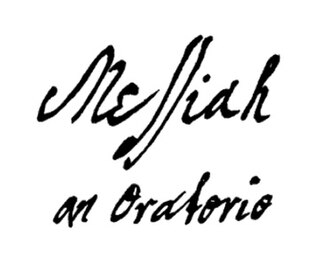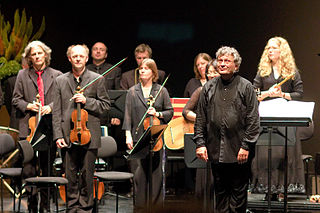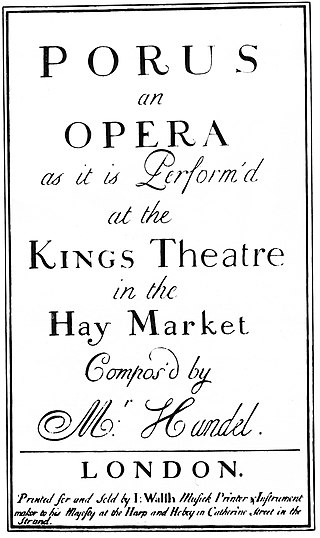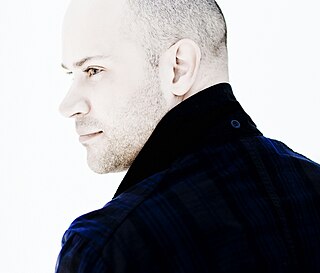Related Research Articles

Messiah is an English-language oratorio composed in 1741 by George Frideric Handel. The text was compiled from the King James Bible and the Coverdale Psalter by Charles Jennens. It was first performed in Dublin on 13 April 1742 and received its London premiere a year later. After an initially modest public reception, the oratorio gained in popularity, eventually becoming one of the best-known and most frequently performed choral works in Western music.

Rinaldo is an opera by George Frideric Handel, composed in 1711, and was the first Italian language opera written specifically for the London stage. The libretto was prepared by Giacomo Rossi from a scenario provided by Aaron Hill, and the work was first performed at the Queen's Theatre in London's Haymarket on 24 February 1711. The story of love, war and redemption, set at the time of the First Crusade, is loosely based on Torquato Tasso's epic poem Gerusalemme liberata, and its staging involved many original and vivid effects. It was a great success with the public, despite negative reactions from literary critics hostile to the contemporary trend towards Italian entertainment in English theatres.

René Jacobs is a Belgian musician. He came to fame as a countertenor, but later in his career he became known as a conductor of baroque and classical opera.

Arminio is an opera composed by George Frideric Handel. The libretto is based on a libretto of the same name by Antonio Salvi, which had been set to music by Alessandro Scarlatti. It is a fictionalisation of events surrounding the Germanic leader Arminius, who defeated the Romans under Publius Quinctilius Varus at the Battle of the Teutoburg Forest in AD 9, and his wife Thusnelda. The opera was performed for the first time at the Covent Garden Theatre on 12 January 1737.

Teseo is an opera seria with music by George Frideric Handel, the only Handel opera that is in five acts. The Italian-language libretto was by Nicola Francesco Haym, after Philippe Quinault's Thésée. It was Handel's third London opera, intended to follow the success of Rinaldo after the unpopular Il pastor fido.

Riccardo primo, re d'Inghilterra is an opera seria in three acts written by George Frideric Handel for the Royal Academy of Music (1719). The Italian-language libretto was by Paolo Antonio Rolli, after Francesco Briani's Isacio tiranno, set by Antonio Lotti in 1710. Handel wrote the work for the Royal Academy's 1726–27 opera season, and also as homage to the newly crowned George II and the nation where Handel had just received citizenship.

Scipione, also called Publio Cornelio Scipione, is an opera seria in three acts, with music composed by George Frideric Handel for the Royal Academy of Music in 1726. The librettist was Paolo Antonio Rolli. Handel composed Scipione whilst in the middle of writing Alessandro. It is based on the life of the Roman general Scipio Africanus. Its slow march is the regimental march of the Grenadier Guards and is known for being played at London Metropolitan Police passing out ceremonies.

Sosarme, re di Media is an opera by George Frideric Handel written in 1732 for the King's Theatre in the Haymarket, London, where it ran for 12 performances. The text was based on an earlier libretto by Antonio Salvi, Dionisio, Re di Portogallo, and adapted by an unknown writer. The original setting of Portugal was changed to Sardis in Lydia.

Siroe, re di Persia, is an opera seria in three acts by George Frideric Handel. It was his 12th opera for the Royal Academy of Music and was written for the sopranos Francesca Cuzzoni and Faustina Bordoni. The opera uses an Italian-language libretto by Nicola Francesco Haym, after Metastasio's Siroe. Like many of Metastasio's libretti, it was also set by Handel's contemporaries, e.g. by Leonardo Vinci, Antonio Vivaldi and Johann Adolph Hasse. Pasquale Errichelli's setting of the libretto premiered in the year of Handel's death.

Poro, re dell'Indie is an opera seria in three acts by George Frideric Handel. The Italian-language libretto was adapted from Alessandro nell'Indie by Metastasio, and based on Alexander the Great's encounter with Porus in 326 BC. The libretto had already been set to music by Leonardo Vinci in 1729 and was used as the text for more than sixty operas throughout the 18th century.

Muzio Scevola is an opera seria in three acts about Gaius Mucius Scaevola. The Italian-language libretto was by Paolo Antonio Rolli, adapted from a text by Silvio Stampiglia. The music for the first act was composed by Filippo Amadei, the second act by Giovanni Bononcini, and the third by George Frideric Handel. Collaborations of groups of composers were common in the 18th century, though this is the only one done in London. Bononcini had written the music for two earlier treatments of this story on his own, works dating from 1695 and 1710.

Bejun Mehta is an American countertenor. He has been awarded the Echo Klassik, the Gramophone Award, Le Diamant d’Opera Magazine, the Choc de Classica, the Traetta Prize, and been nominated for the Grammy Award, the Laurence Olivier Award, and the Preis der Deutschen Schallplattenkritik. Writing in the Süddeutsche Zeitung, Michael Stallknecht called him "arguably the best counter tenor in the world today."
Robin Blaze is a British countertenor.

The Triumph of Time and Truth is the final name of an oratorio by George Frideric Handel produced in three different versions across fifty years of the composer’s career:

"Lascia ch'io pianga", originally "Lascia la spina, cogli la rosa", is an Italian-language soprano aria by composer George Frideric Handel that has become a popular concert piece.

Sara Mingardo is an Italian classical contralto who has had an active international career in concerts and operas since the 1980s. Her complete recording of Anna in Hector Berlioz's Les Troyens won a Gramophone Award and both the Grammy Award for Best Opera Recording and the Grammy Award for Best Classical Album in 2002. Some of the other roles she has performed on stage or on disc include Andronico in Tamerlano, Mistress Quickly in Falstaff, Rosina in The Barber of Seville, and the title roles in Carmen, Giulio Cesare, Riccardo Primo, and Rinaldo. She has also recorded several Vivaldi cantatas, Bach cantatas, and such concert works as Mozart's Requiem, Rossini's Stabat Mater, and Vivaldi's Gloria among others.
Christine Weidinger is an American operatic soprano who has had an active international career in operas and concerts since the early 1970s. Her career started at the Metropolitan Opera, after which she was active as a resident artist with opera houses in Germany during the late 1970s and 1980s. From the 1970s through the 1990s she worked as a guest artist with many leading opera houses throughout Europe, South America, and the United States.

Tim Mead is an English countertenor.
Romina Basso is an Italian mezzo-soprano with an extensive discography of baroque opera recordings. She is particularly noted for her performances of Vivaldi.

Jakub Józef Orliński is a Polish operatic countertenor singer and breakdancer. He has performed leading roles with many opera companies, including Metropolitan Opera, Royal Opera House, Warsaw Grand Theatre and Oper Frankfurt.
References
- ↑ Thomas, Christopher J. "Rinaldo and Rinaldo highlights". The Opera Quarterly . 3 (3): 183–88. doi:10.1093/oq/3.3.183.(subscription required)
- 1 2 Sadie, Stanley (May 2003). "Handel: Rinaldo". Gramophone . p. 78.
- ↑ Handel: Rinaldo, Presto Classical
- ↑ "Handel: Rinaldo". Gramophone .
- ↑ Quinn, Michael (September 2004). "Session Report: The Aradia Ensemble's Rinaldo". Gramophone. p. 11.
- ↑ "Recordings of Rinaldo". Prestoclassical.co.uk. Retrieved 15 July 2014.